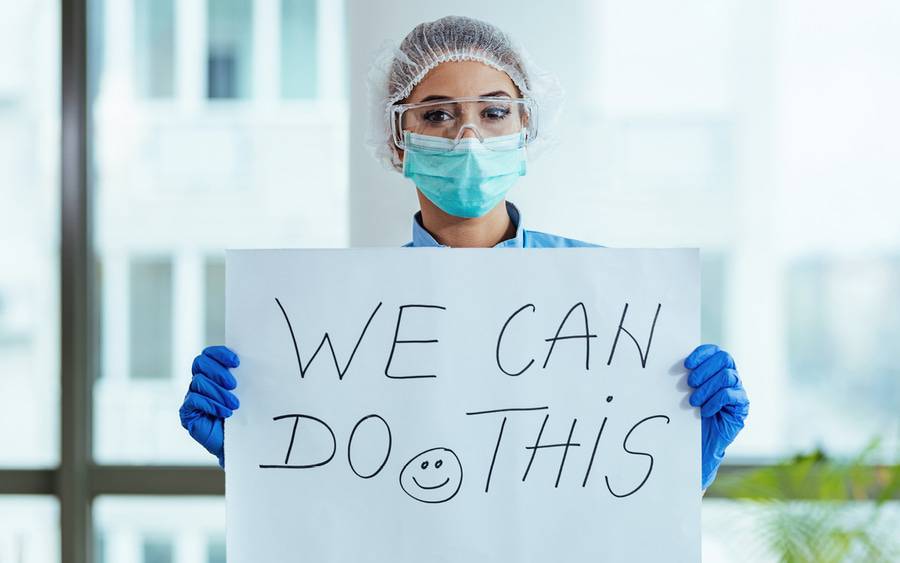8 Coping Tips for Health Care Workers During Pandemic
Coping strategies for stress and building resilience

Coping strategies for stress and building resilience
Doctors, nurses and other medical workers have been widely praised for their work on the front lines caring for patients during the COVID-19 pandemic. While they continue to be heroes to many, we must not forget that they are also vulnerable to the pressures of their demanding jobs.
Challenging work conditions, even before the pandemic, put health workers at risk for mental health problems, including stress, burnout, depression, anxiety, substance use disorders, and suicidal behavior, according to the Centers for Disease Control and Prevention (CDC).
Experts recommend health care workers adapt healthy coping strategies to manage stress and avoid physical or mental fatigue and burnout.
“Health care workers often think of the needs of others before their own. As valiant and admirable as that may appear at first, it often creates a situation in which these highly skilled, much needed health care workers hit the wall and render themselves ineffective,” says Leah Welch, PhD, a psychologist at Scripps Health.
“If you’re a health care worker, it is absolutely mission-critical that you take time to care for yourself and your family and other loved ones while dealing with the COVID 19 crisis,” Welch says.
The CDC recommends that those who are feeling overwhelmed with emotions like sadness, depression or anxiety ask for help.
Here are eight tips to help with stress reduction and build resilience:
1. Take care of your body
Try to eat healthy, well-balanced meals, exercise regularly and get plenty of sleep. Avoid alcohol, tobacco and other drugs.
“As hard as it may be with gyms and fitness classes closed, a walk outside is still considered a safe thing to do,” Welch says. “Exercise or staying physically active does a body good, helps you release stress and makes you stronger for the things you need to do in your life — both at and outside of work.”
Be sure to leave enough time for sleep. If you’re not sleeping well, try to practice good sleep hygiene — avoid caffeine and alcohol before bedtime, have a nighttime ritual, use your bed for sleep rather than watching TV or other activities.
“Trying to function without enough sleep is a losing battle over time,” Welch says.
2. Stay connected with loved ones with social distancing
During the pandemic, we’ve learned how easy it is to stay socially connected — via texting, social media, videoconferencing and even phone calls — while practicing physical or social distancing. Make time to check in with loved ones.
“Knowing that your parents, kids, other family members and friends are doing well and accounted for is good for your psyche and for helping you keep your head in the game at work when you need to be focused,” Welch says.
3. Check in with your colleagues about job stress
The CDC recommends:
- Talking openly about how the pandemic is affecting your work
- Identifying factors that cause stress and work together to identify solutions
- Asking about how to access mental health resources in your workplace
Welch recommends taking time to recognize the efforts and sacrifices made by your colleagues. “Make sure that you’re being good to each other, looking out for each other and helping anyone who may have lost perspective,” she says.
4. Take brief mindfulness breaks
According to the American Heart Association, practicing mindfulness and meditation may help you manage stress and high blood pressure, sleep better, feel more balanced and connected, and even lower your risk of heart disease.
Use a free meditation app, such as Insight Timer and take a mindfulness break for just a few minutes or longer.
“Focusing on the here and now and your breath is always a peaceful place where it’s just you and your lungs, even if just for a moment,” Welch says.
5. Notice your self-talk
Focusing on negative thoughts may lead to decreased motivation as well as greater feelings of helplessness. Check if you are prone to catastrophizing self-talk when you hear new information about the virus before verifying the information, according to Welch.
6. Focus on one patient at a time
There may be a lot of patients who need your help. Remember you can help them — one at a time by providing excellent care. If you dwell on the number of people who may be affected overall, it will not help you take care of the patient or situation in front of you. Take one thing at a time and do your best.
7. Healthy coping in moderation
Be aware of any numbing behaviors you may have — such as drinking alcohol, taking other substances and even eating — that can have bad long-term consequences. Be mindful to do things in moderation.
“Overindulgence may numb you out temporarily, but it can lead to poor longer-term consequences,” Welch says.
If you feel you may have a problem with alcohol or drugs, including prescription drugs, ask for help.
8. Get comfortable with physically distancing
It may be hard at first to remind people to physically distance, especially if you or the people you are with are very social. It can feel rejecting or awkward to ask for a little more space or to try to shake hands in a new way. It could be a virtual hug or an air high-five.
“Don’t be afraid to let people know that you care about them, about yourself and also about doing your part to help protect others from the spread of this virus by keeping a little more distance,” Welch says.